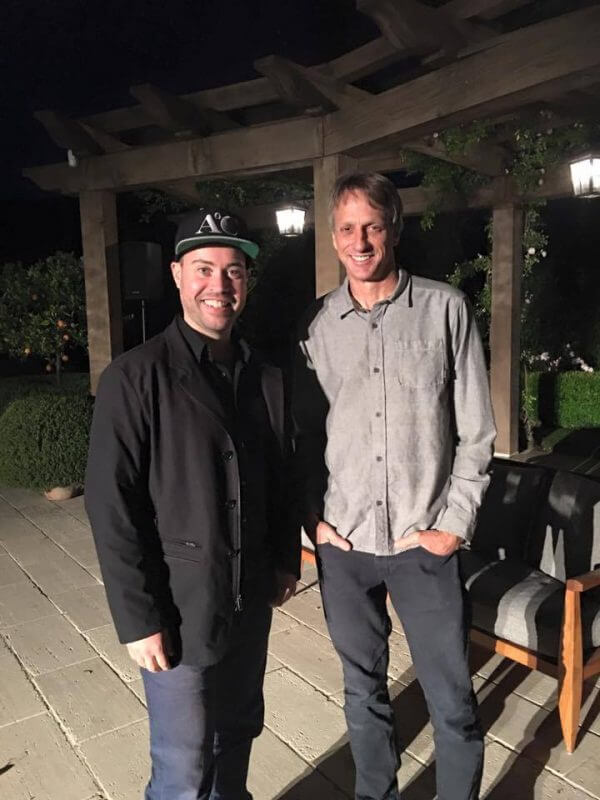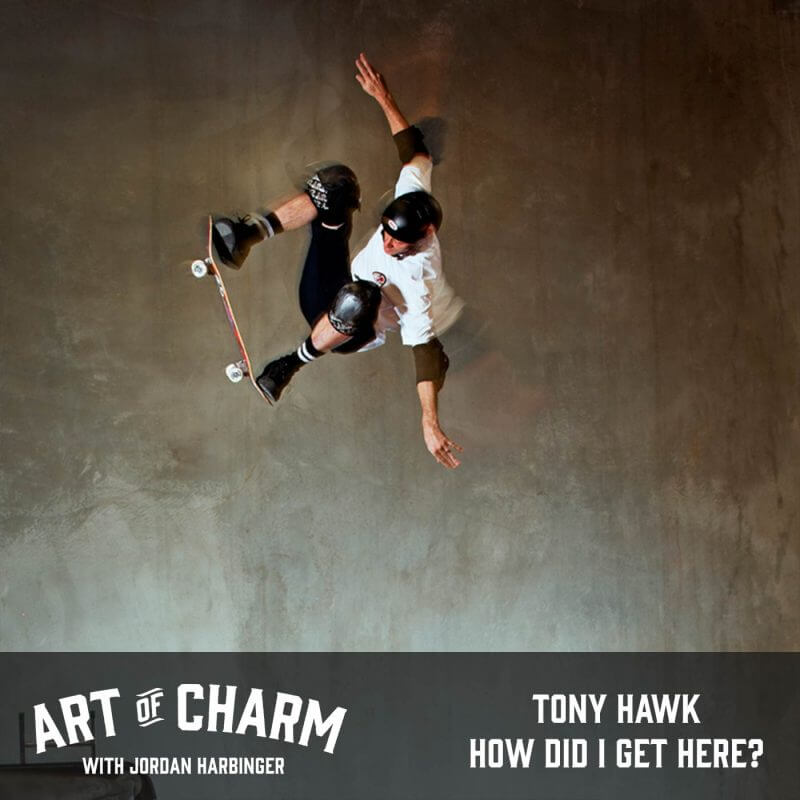Tony Hawk (@tonyhawk) is a vertical skateboarding legend who enjoys household name status these days, but as we learn in discussing his book How Did I Get Here?: The Ascent of an Unlikely CEO, the journey’s been far from easy.
“There’s this roll of toilet paper behind him with my name on the outside of it and I was like, “What is that?” He said, “Oh, that’s a joke because one of our retailers said, ‘Well you can put anything with Tony Hawk’s name on it and it’ll sell — even toilet paper,’ and so we made that for them.
“I think at that moment I realized that I was not a person to them. I wasn’t someone to be respected. I was just a name, a brand, and for them to do whatever the hell they wanted to make as much money as they wanted. I ended up paying to get out of my contract with them. That was my first lesson in terms of keeping control of a brand.” -Tony Hawk
The Cheat Sheet:
- Why taking risks is important for the sake of progress.
- How personal success can be gauged independently of financial success.
- Why your personal brand needs to be genuine and something you’re willing to protect.
- Why it’s important to learn everything about your craft — even if you’ve “got a guy who handles that.”
- What The Tony Hawk Foundation does for underserved communities.
- And so much more…
[aoc-subscribe]
San Diego native Tony Hawk has been blowing minds with unparalleled feats and firsts in the world of vertical skateboarding since the ’80s. Now a household name with various franchises under his belt, Tony joins us to talk about brand protection, the part he’s played in the recognition of skateboarding as a legitimate sport, what kept him going even through the tough times of Taco Bell and Top Ramen sustenance, how the Tony Hawk Foundation benefits low-income communities, and more.
You might be surprised at how someone so famous for flying can be this down to Earth as we discuss the adventures from his book How Did I Get Here?: The Ascent of an Unlikely CEO. Enjoy!
Download Episode Worksheet Here
More About This Show
Upon his first exposure to seeing people “flying out of empty swimming pools” in the ’70s, Tony Hawk knew skateboarding was something he wanted to learn how to do. And even as his older brother and friends from the neighborhood eventually grew out of the sport and moved on to other trends, Tony kept at it — and with this devotion came a newer, stranger set of friends.
“I couldn’t give it up because I felt like it was finally something that I kept improving at — that I got a feeling of self-confidence that I had never found in any other sport,” says Tony. “I just stuck with it and suddenly found myself in with all these oddball characters. Skating really attracted people who were willing to try something different — who wanted to be set apart from the status quo — and I loved it. They were all artsy, kind of strange, but really creative.”
While this description might conjure images of outcasts straight from Revenge of the Nerds, Tony and his strange friends were a tough crew who endured hospital visits and oral surgery for the love of their craft.
“That is the defining moment of — if you want do this seriously or continue to do it — is the moment you get hurt,” says Tony. “Do you love it so much that you’re going to push through this and learn from your mistake, or is that the sign that you have to stop because you don’t like getting hurt? One of my worst injuries in the beginning was I got a concussion; I knocked my teeth out. I knew when I woke up — literally when I woke up in the pro shop of the skate park — that I wanted to get back out there and do it. It wasn’t going to stop me even though I had this extremely tragic injury.”
An extended period of convalescence might not be a prerequisite for becoming a successful skateboarder, but it does signify a spirit willing to overcome whatever obstacles dare to stand in the way of a chosen pursuit. For Tony, skateboarding was just one such pursuit. His determination in the face of adversity has carried over to business, personal brand protection, parenting, touring, charity work, and every aspect of what’s so far been — in anyone’s estimation — a full and fulfilling life that shows no slow in momentum.

“I walk the walk. I go skate!” says Tony. “That’s my best explanation.”
Listen to this episode of The Art of Charm in its entirety to learn more about what motivates Tony’s business decisions, why he feels it’s important to be obsessed about the entire entity or industry of what you’re doing, why scraping by in pursuit of what you love beats a compromise of integrity, what Tony’s backup plan would have been if professional skateboarding and the resulting franchises hadn’t worked out, how at least one from the next generation of Hawks is pioneering a subculture, and lots more.
THANKS, TONY HAWK!
If you enjoyed this session with Tony Hawk, let him know by clicking on the link below and sending him a quick shout out at Twitter:
Click here to thank Tony Hawk at Twitter!
Resources from this episode:
- How Did I Get Here?: The Ascent of an Unlikely CEO by Tony Hawk
- The Tony Hawk Foundation
- Birdhouse Skateboards
- Tony Hawk’s official website
- Tony Hawk at Instagram
- Tony Hawk at Twitter
- Mount Trashmore King of the Hill ’85
- Bones Brigade video
- Spencer Hawk’s “Nintendo rave music”
- First 900 (June 27th, 1999 X Games)
- 900 at 48 (June 27th, 2016 — 17 years to the date of the first 900 at X Games)
You’ll Also Like:
- The Art of Charm Challenge (click here or text 38470 in the US)
- The Art of Charm Bootcamps
- Best of The Art of Charm Podcast
- The Art of Charm Toolbox
- The Art of Charm Toolbox for Women
- Find out more about the team who makes The Art of Charm podcast here!
On your phone? Click here to write us a well-deserved iTunes review and help us outrank the riffraff!
